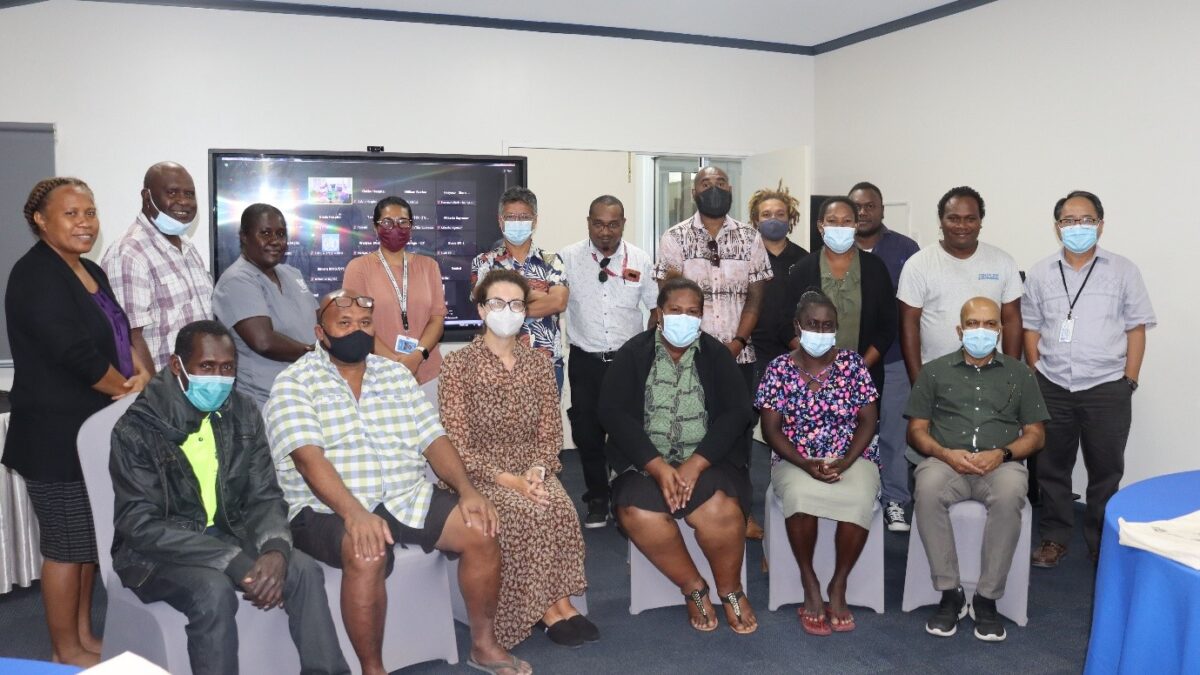

Group photo of the participants
Capacity to deal with adverse events following immunization further strengthened, as health steps up routine immunization and COVID-19 vaccination.
With ongoing rollout of COVID-19 vaccination and renewed efforts to step up routine immunization coverage across the country the Ministry of Health and Medical Services together with partners are also bolstering capacity to respond to any Adverse Events Following Immunization (AEFI).
These adverse events vary from minor and expected side effects such as pain at injection site, fever, headaches and nausea to the most severe form of adverse events, medical known as anaphylaxis, but rarely occur. All these are not new and have been encountered and treated with medication, throughout years of rolling out routine immunization and more recently with COVID-19 vaccines.
Clinicians, doctors and nurses, both at national level and the provinces joined the training which was conducted in Honiara via face to face mode for national team and zoom mode for those in the provinces.
Participants comprised of those who have already been engaged in COVID-19 vaccine roll out and in routine immunization and additional capacity to assist with the current need to speed up roll out and uptake of vaccines. The training covered three critical areas, a case definition, reporting and management.
Mrs. Jennifer Anga, Manager for National Immunization Program of health at the training thanked WHO, UNICEF, National Centre for Immunization Research and Surveillance (NCIRS) and Australian Therapeutic Goods Administration (TGA) Representatives for supporting facilitation of the training.
“The training was indeed useful both as a refresher for those whom have already been involved in vaccination programs and serves as critical information for those whom have come on board to join the vaccine roll out efforts”,
“Vaccines safety, types of vaccines and adverse events, surveillance and investigation of AEFI cases, AEFI casualty assessment, management of AEFI, AEFI communication and COVID-19 therapeutics, were amongst some of the topics that the training deep dive into”, outlined Mrs. Anga. The facilitators included staff from WHO Regional office and WHO Division of Pacific Technical Support, but also experts from Australia’s NCIRS, like Prof Kristine Macartney, the Director and a member of WHO Global Advisory Committee on Vaccine Safety.
Mrs Anga reiterated calls for parents and guardians to ensure that their children get their vaccination doses in a timely manner as per the schedule in their baby books and those who are not yet vaccinated against COVID-19 to do so immediately.
World Health Organisation, Technical Officer for Maternal Child-Health Program Dr Sonja Tanevska explained that the training is important because Solomon Islands is lagging behind other countries in terms of immunization coverage for both COVID19 and routine immunization, and therefore while work to speed up coverage is ongoing, so too must be the capacity to stand ready to deal with any adverse events.
She echoed similar sentiments of encouragement to communities to vaccinate for COVID19 and to parents and guardians to get their babies and children vaccinated. “Failure to improve and maintain coverage rate at required levels could result in devastating impact to our health and lives should an outbreak of vaccine preventable diseases occur”,
“Reports of outbreak of measles and increases in measles as well as increase of COVID19 cases with our neighbouring countries is already a concern, , therefore the need for us to move swiftly increasing coverage and that is what WHO is working closely with the Ministry of Health to fulfil”, explained Dr Tanevska.

National Immunization Manager Jennifer Anga speaking at the training

WHO Technical Officer for Maternal Child Health Program Dr Sonja Tanevska speaking during the training

Some of the participants listening during presentations

Some of the participants doing pre-test at the training
-MHMS Press